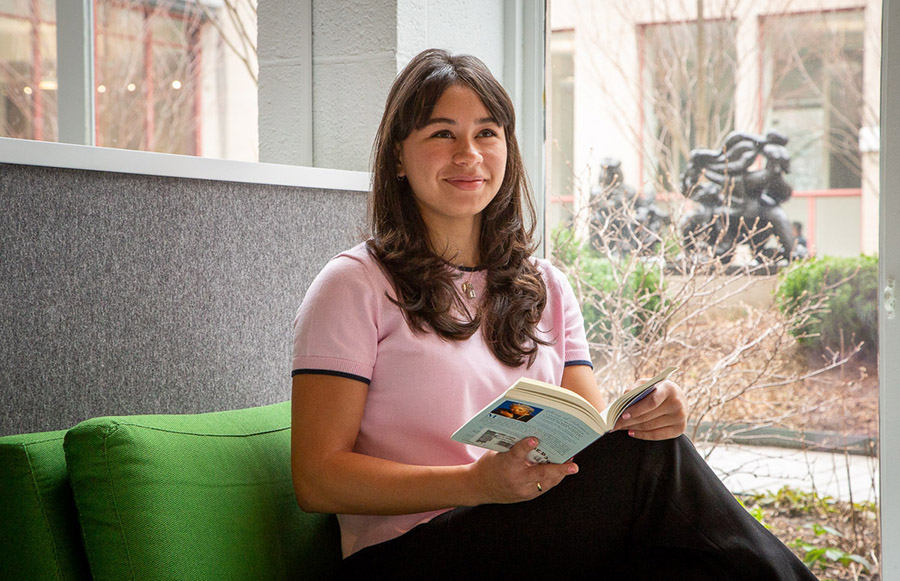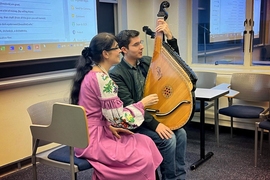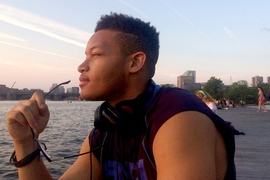Senior Grace McMillan grew up in western New York state in an all-woman intergenerational home. In the 1980s, her grandmother and mother defected from the USSR and came to the United States as refugees. They were the only Ukrainian family in their semi-rural town.
“My mom would tell me stories about how tough things were when she was growing up,” McMillan says. “I learned from her that my life is in my own hands, and I can do anything if I just put my mind to it.”
As she began thinking about her future, she developed an interest in space through movies. Soon, she was intently reviewing the academic prerequisites to becoming an astronaut on the NASA website. “I knew I needed a bachelor of science. I told myself I was going to MIT,” she says.
McMillan was accepted Early Decision with a full-ride scholarship through QuestBridge, a platform that matches high-achieving, low-income high school students with top colleges and universities.
She was ecstatic to enroll at MIT, but adjusting to urban life in Boston as a first-year was still a big change. “It was vertigo. The buildings were so tall, and the streets were so busy.” Simultaneously, her autoimmune disease flared, and she was hospitalized several times that spring. “[MIT Health] staff are wonderful and always really listened, and sent me to the right specialists,” she says.
Though she eventually found a treatment, McMillan stayed committed to prioritizing her health while also excelling academically. Now, she helps make on-campus health care more accessible in her role as a student representative on the MIT Health Consumers’ Advisory Council.
Combining humanities and engineering
Ultimately, McMillan’s interests shifted away from space exploration. But that doesn’t mean she stopped aiming for the stars.
She chose Course 21E (Humanities and Engineering), an ambitious joint degree program offered through the School of Humanities, Arts, and Social Sciences.
“I had learned to love reading so much that I knew even before coming to MIT that I would study the humanities,” McMillan says. “Writing, however, doesn’t come naturally to me.” She challenged herself to take writing-intensive literature courses to master the written word and gain confidence in her communication skills.
Her humanities coursework has included Russian language — McMillan wanted to connect with the language she heard spoken at home but never formally studied. She took five courses with Maria Khotimsky, a senior lecturer who developed the MIT Russian curriculum. “She has gone above and beyond to help me in every way: academic support, career support, just listening to me, and even making her classes breakfast. Her courses pushed me to be a better Russian language speaker.”
It was Khotimsky who encouraged her to attend a Russian language immersion program in Bishkek, Kyrgyzstan, where she lived with a local family for eight weeks over summer 2022. While studying there, McMillan was reminded of the simplicity of her childhood in upstate New York. “Living in a city like Boston, where you need a phone or the internet to do anything, it's easy to forget that sometimes a simple solution is better than a highly technological one.”
“Engineers need communication skills”
She brought this global perspective back to MIT and applied it to a team-based capstone engineering project involving designing a software-free laser-powered cutting machine for artists.
She explains, “The principle is that you draw on your material and our product will cut it out for you. It will use a built-in camera and program to guide a laser without requiring access to a computer.”
McMillan says her humanities courses helped her to work better on a team. “Engineers need communication skills. You can be the smartest person in the room, but no one will care if you can’t convey your ideas effectively.”
As a junior, McMillan pledged to the Sigma Kappa sorority after reflecting on how too much of her Covid-era life had been, by necessity, spent behind a computer and not with other humans. She considers moving into the group’s house one of her best college decisions. “I found a community of like-minded women who are invested in helping each other succeed, both academically and in our personal lives,” she says.
When McMillan isn’t in class or hanging out with her sisters, she’s in the library studying for the Law School Admission Test. She is determined to use her legal education to focus on education policy reform. “As a kid, I had mentors and teachers who advocated for me in ways I could never have imagined. I want to be able to pay it forward and help every student get that kind of access, too,” she says.









